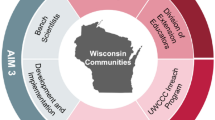Abstract
This manuscript illustrates general concepts of mentoring in low- and middle-income countries (LMICs). The focus of this manuscript is on public health research based on our experiences with the Cancer Epidemiology Education in Special Populations (CEESP) Program which is further illustrated in this Supplement. While the CEESP Program provides research training in global and US minority settings, this manuscript is focused on the global aspects of the program. We describe the process of selecting students into the CEESP Program, the process of mentoring them, and the preparation of the mentoring sites. We emphasize the review of the CEESP mentors in LMICs and put forward recommendations for enhancing their mentoring skills and disseminating the experience to other US and global institutions interested in global cancer education.
Similar content being viewed by others
References
Okereke C (2000) Mentoring—the trainee’s perspective. J Accid Emerg Med 17(2):133–135
Eby LT, McManus SE (2004) The protégé’s role in negative mentoring experiences. J Vocat Behav 65(2):255–275
Lescano AG, Cohen CR, Raj T et al (2019) Strengthening mentoring in low- and middle-income countries to advance global health research: an overview. Am J Trop Med Hyg 100(1_Suppl):3–8
Gary J, Armstrong P (2003) Academic health leadership: looking to the future. Clin Invest Med 26:315–326
Sambunjak D, Straus SE, Marusic A (2006) Mentoring in academic medicine: a systematic review. JAMA 269(9):1103–1115
Kashiwagi DT, Varkey P, Cook DA (2013) Mentoring programs for physicians in academic medicine: a systematic review. Acad Med 88(7):1029–1037
Nowell L, White DE, Benzies K, Rosenau P (2017) Exploring mentorship programs and components in nursing academia: a qualitative study. J Nursing Education and Practice 7(9):42–53
Waljee JF, Chopra V, Saint S (2018) Generational differences in mentoring relationships—reply. JAMA 320(10):1038
Warraich HJ (2018) Generational differences in mentoring relationships. Jama 320:1037–1038
Association of American Medical Colleges (AAMC) (2017) Compact between biomedical graduate students and their research advisors a framework for aligning the graduate student mentor-mentee relationship January 2017. A publication of the Association of American Medical Colleges
Henry-Noel N, Bishop M, Gwede CK (2019) Mentorship in medicine and other health professions. J Cancer Educ 34:629–637
Katz F, Glass RI (2019) Mentorship training is essential to advancing global health research. Am J Trop Med Hyg 11(1_Suppl):1–2
Taherian K, Shekarchian M (2008) Mentoring for doctors. Do its benefits outweigh its disadvantages? Med Teach 30:e95–e99
GandhiM, Raj T& Mmbaga B et al (2018) Mentoring the Mentors: Implementationand Evaluation of Four Fogarty-Sponsored Mentoring Training Workshopsin Low-an Middle-Income Countries. Am J Trop Med Hygiene. 100. 10.4269/ajtmh.18-0559
JacksonVA, Palepu A, Szalacha L, Caswell C, Carr PL, Inui T (2003) "Havingthe right chemistry": a qualitative study of mentoring inacademic medicine. Acad Med: J Assoc Am Med Colleges. 78(3):328–34
SolimanAS and Chamberlain RM (2016) Short- and Long-term Outcomes of Student Field ResearchExperiences in SpecialPopulations. J Cancer Educ 31(2):328–37 https://doi.org/.10.1007/s13187-020-01716-2
SolimanAS, Stainton L, Chamberlain RM (2020) Experiential Learning in CareerDevelopment. J Cancer Educ. https://doi.org/.10.1007/s13187-020-01716-2
ListJM, O’Connor JM.J Ethics.22(2):E147–155. https://doi.org/.10.1001/amajethics.2020.147
AlmanzaLA (2020) Virtual scientific conferences open doors to researchers aroundthe world.Science https://www.sciencemag.org/careers/2020/09/virtual-scientific-conferences-open-doors-researchers-around-worldSep
Author information
Authors and Affiliations
Corresponding author
Additional information
Publisher’s Note
Springer Nature remains neutral with regard to jurisdictional claims in published maps and institutional affiliations.
Rights and permissions
About this article
Cite this article
Soliman, A.S., Chamberlain, R.M., Michalek, A. et al. Mentoring in Global Cancer Research Training. J Canc Educ 36 (Suppl 1), 50–54 (2021). https://doi.org/10.1007/s13187-021-02034-x
Accepted:
Published:
Issue Date:
DOI: https://doi.org/10.1007/s13187-021-02034-x




